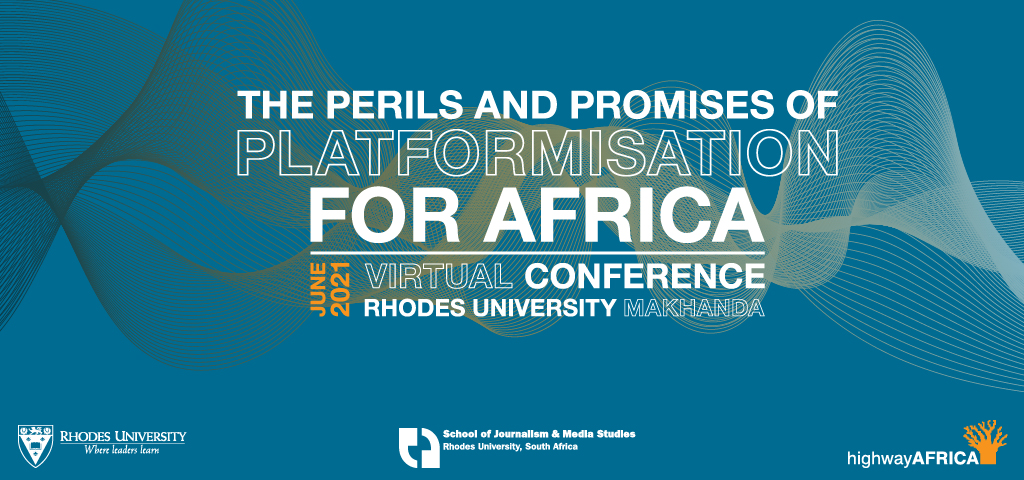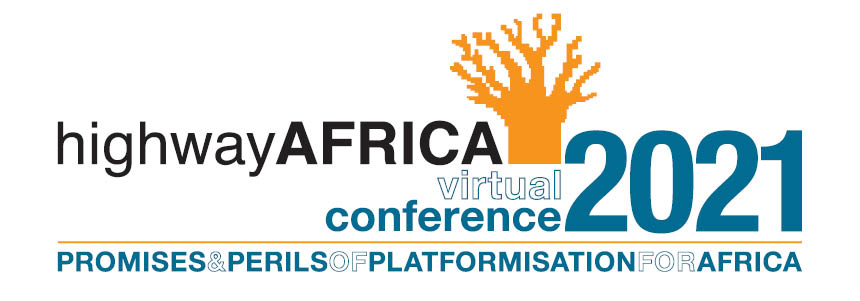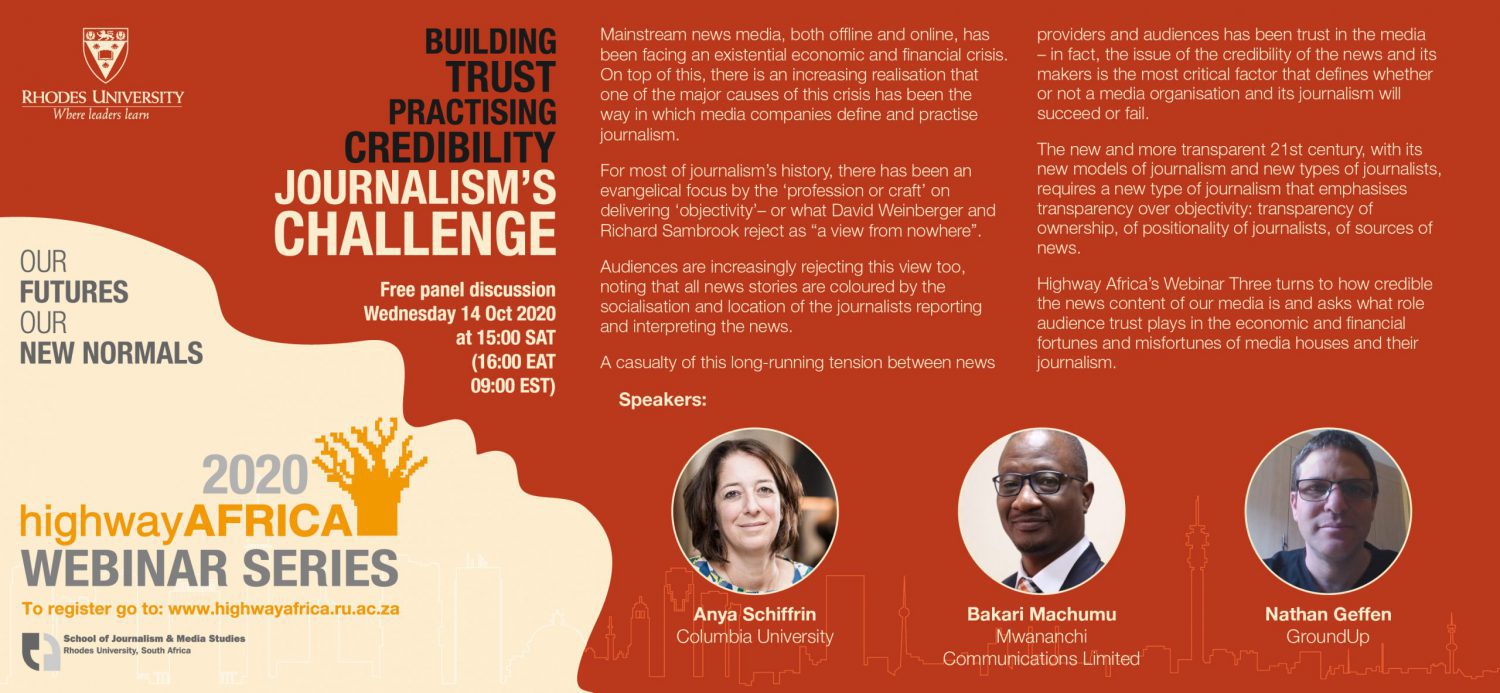
by Amm Admin | Dec 4, 2020 | Blog
Highway Africa (HA), the continent’s biggest media conference run by the School of Journalism and Media Studies at Rhodes University, held its third webinar, entitled “Building Trust Practicing Credibility: A Journalism Challenge,” on 14 October.
This webinar looked at the credibility of the media’s news content and the role audience trust plays in the economic and financial fortunes and misfortunes of media houses. It formed part of the “Our Futures, Our New Normals” webinar series that seek practical solutions to challenges that face African media and journalism in the era of Covid-19 and how to explore and exploit emerging opportunities.
Speaking at this event, Anya Schiffrin, from the International & Public Affairs School, Columbia University, noted that that there has been a renewed interest in trust and credibility within the media post-2016 after Donald Trump came into power in the United States.
Schiffrin also pointed out that the latest 2020 Reuters Digital News Report indicates that media trust is currently rising. “What we have seen since Covid-19 is a vast increase in consumption of news, and people are turning back to reliable sources for information about the virus,” Schiffrin said.
Two editors on the frontline of dealing with trust and credibility within the media, Bakari Machumu, Executive Director of Mwananchi Communications based in Tanzania, and Nathan Geffen, Editor for GroundUp, South Africa, joined Schiffrin as panelists in this webinar.
Machumu noted that their media company is guided by editorial policies, a working governing body, and editorial committee that oversee the newsroom and trust and credibility issues.
Machumu further noted that over the years, they had made their editorial policies public to let the public aware and judge the media company on their performance
Geffen stated that they have stringent editing, fact-checking, and peer review processes in their news agency to minimize the trust-breaking errors.
Geffen further said: “We have to try and put aside our preconceived ideas and notions and try and be as fair as possible to all parties no matter what we might personally think of them.”
In his closing remarks, Bakari emphasized the need to collaborate as an industry and different players in the sector, those in the newsroom, the regulators, and other stakeholders. He called for more research to help understand the challenges the media in Africa are facing.
The webinar was hosted by Professor Anthea Garman, the Acting Head of the School of Journalism and Media Studies, and Francis Mdlongwa, the Director of Rhodes University’s Sol Plaatje Institute (SPI) for Media Leadership and the Acting Director of Highway Africa.
Highway Africa has usually run annual conferences focused on developments of the continent’s journalism and media and are attended by hundreds of African journalists.
There will be no conference in 2020 because of Covid-19, but a virtual Highway Africa summit conference is planned for June 2021.
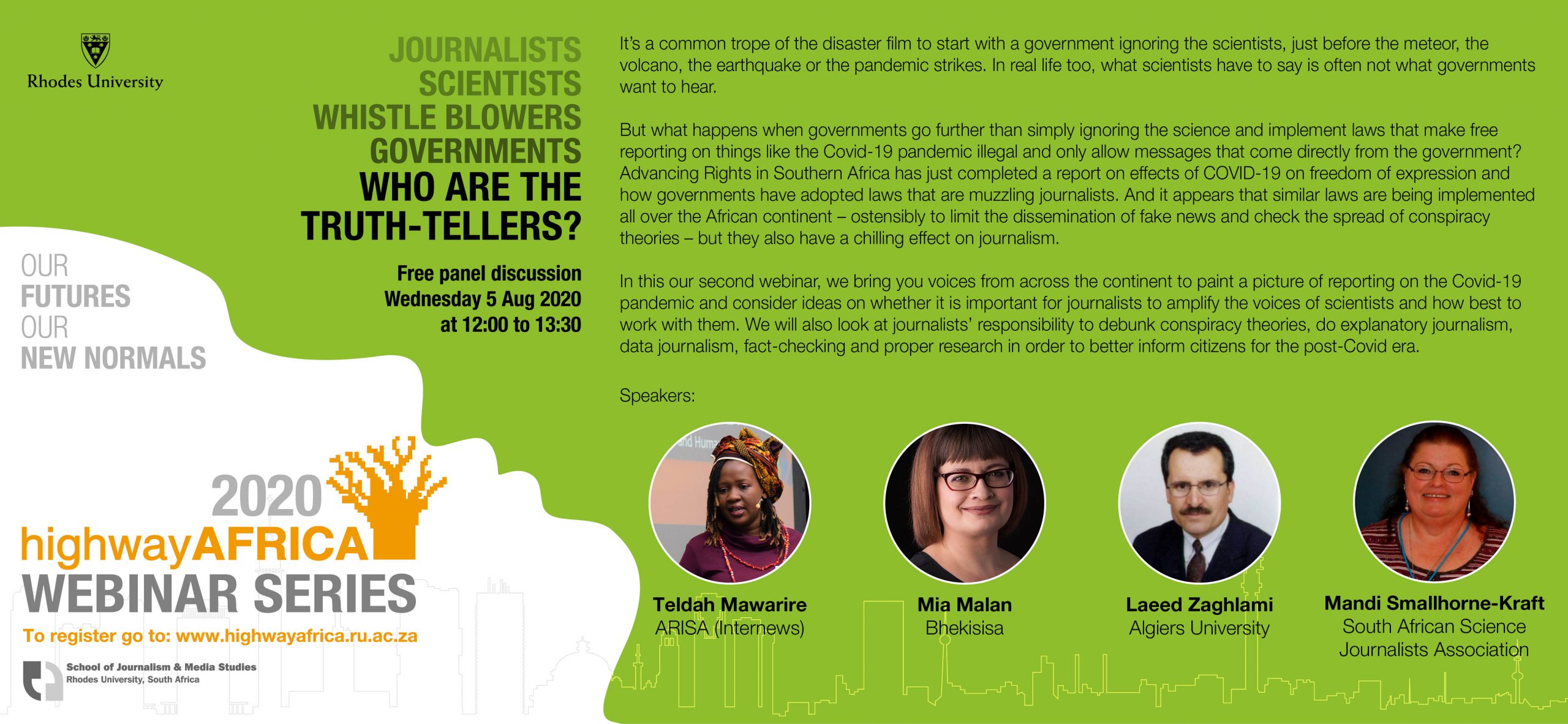
by Amm Admin | Aug 15, 2020 | Blog
Makhanda (Grahamstown), South Africa — Highway Africa (HA), the largest conference for African journalists on the continent, hosted its second webinar entitled “Journalists, Scientists, Whistle-blowers, Governments: Who are The Truth-Tellers” on August 5.
This session was part of a series of Highway Africa webinars, hosted by the School of Journalism and Media Studies at Rhodes University, that seeks practical solutions to challenges faced by African media and journalism in the era of Covid-19.
In this second webinar, four media experts from across the African continent discussed how to navigate the rocky terrain of deciding who to trust amongst journalists, scientists, governments and whistle-blowers in the time of the Covid-19 pandemic.
Teldah Mawarire, a project director at Internews shared worrying findings from a recent Internews research project that examines freedom of expression for journalists across Southern Africa in the Covid-19 era. She noted that “some of the laws which are meant to respond to Covid-19 are infringing and curtailing on freedom of expression”. The research shows that laws prohibiting disinformation and carrying large financial penalties are leading to self-censorship among journalists across the region. It also reveals that some countries in the region have pronounced government sources to be the only legitimate sources for Covid-19 reporting. This has crippled investigative journalism and has made it nearly impossible to report independently on infection numbers and Covid-19’s impact on communities and hospitals in Southern Africa.
Mawarire also highlighted the acute lack of personal protective equipment (PPE) for Southern African journalists and the severe financial pressures affecting print media sustainability in the region. The Internews report focused on seven Southern African countries which include: Zimbabwe, Zambia, Eswatini, Lesotho, South Africa, Botswana and Malawi. It will be released on the Internews website (https://internews.org/) in the next few weeks.
Mawarire shared the platform with Mia Malan, the founding editor-in-chief of Bhekisisa Centre for Health Journalism, a pioneering, donor-funded health media start-up in South Africa; as well as Dr Laeed Zaghlami, a professor in the faculty of Information and Communication at Algiers University in Algeria.
Malan reflected on the difference in reporting between two different pandemics, that of HIV/Aids, and the current Covid-19 pandemic. She noted that in the case of HIV/Aids there were better opportunities to report on studies as the epidemic was slower-paced than Covid-19.
Malan explained that the pandemic has revealed the importance for all journalists, not just science journalists, to understand the process of scientific research and publication. Such knowledge can help journalists realise how to make sense of untested information that is regularly circulated online in the form of prepublication drafts. These drafts facilitate the rapid circulation of scientific ideas when urgent solutions are needed to save lives, but also need to be treated with some scepticism. An overview of prepublication drafts reveal numerous discrepancies in Covid-19 studies and such research often has to be retracted later or adjusted after peer review. Journalists need to understand the difference between pre-publication drafts and peer-reviewed articles and should only rely on peer-reviewed publications in their reporting.
“There are a few rules to be followed. If it sounds too good to be true, then it probably is. When you get fast-tracked research, you need to raise your eyebrows. When you see a scientist speaking outside of their field of expertise, then question their credibility and ask questions”, Malan warned.
Zaghlami echoed Malan’s sentiments on the importance of checking the credibility of both information and sources. He noted that in Algeria there has been a massive increase in social media usage over the past year, particularly of Facebook and YouTube. This has resulted in the rise of conspiracy theories, as well as controversial and fake news, especially around Covid-19.
The webinar was moderated by Dr Alette Schoon, a senior lecturer at the School of Journalism and Media Studies at Rhodes University, and Julian Jacobs, a PhD candidate at the school, who has worked in the area of science/health communications for more than 15 years.
Malan called for partnerships between the media, civil society organisations, scientists, governments and epidemiologists to collaborate around media solutions for addressing the Covid-19 pandemic. She remarked that small media start-ups focusing on health were ironically better suited to survive the current economic challenges than many large media organisations, particularly print publications.
Highway Africa, established more than two decades ago, has developed a reputation as the conference that engages with the most important issues facing media practitioners in Africa. While there will be no face-to-face conference in 2020 because of Covid-19, planning is underway for a Highway Africa summit conference for June 2021.
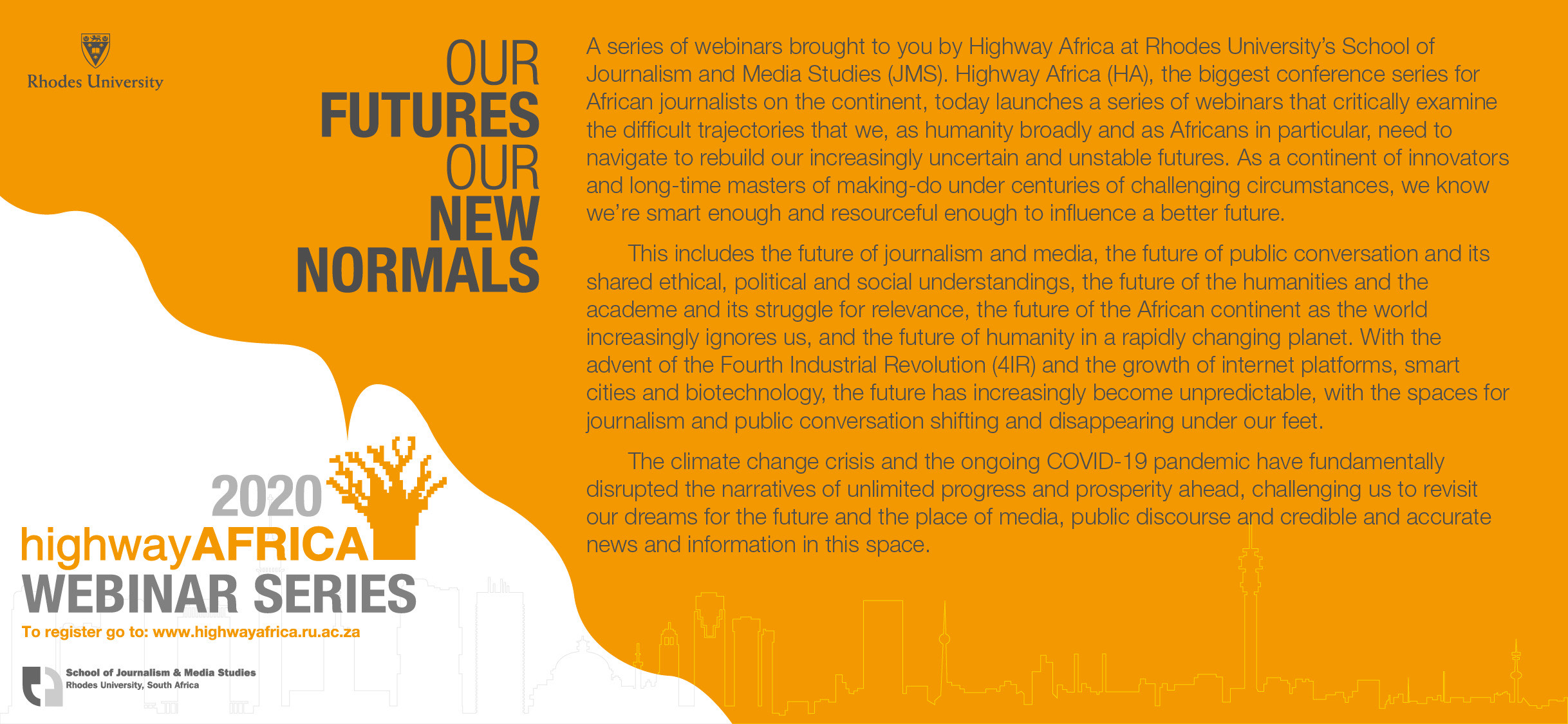
by Amm Admin | Jul 23, 2020 | Blog
Reporting: Julian Jacobs
Editing: Francis Mdlongwa
Makhanda (Grahamstown), South Africa — Highway Africa (HA), the continent’s biggest and oldest conference series run by Rhodes University, has launched a series of high-level webinars that seek practical solutions to challenges that face African media and journalism in the era of Covid-19 and how to exploit emerging opportunities.
The first of these webinars was held on 30 June and brought together some of Africa’s leading media owners, editors and commentators, who shared their insights and experiences on ‘’The Future of Journalism and Media in Africa’’ during the 90-minute online seminar. The series is dubbed ‘’Our Futures, Our New Normals’’.
Covid-19, a novel virus that erupted last December, has killed hundreds of thousands of people across the world and decimated businesses and left millions of people jobless as governments shut their economies to try to arrest the pandemic’s spread.
Many media companies in Africa and across the world have folded because of the pandemic, throwing thousands of journalists out of their jobs in the worst health pandemic to hit the globe since the Spanish flu that killed millions in 1918.
In an ironic development, Covid-19 has also enabled some leading news firms such as The New York Times, The Wall Street Journal and the Financial Times of London to dramatically increase the number of their paying readers and thus increase their revenue as audiences frantically sought trusted news content on the pandemic. These newspapers had long placed their journalism under paywalls, which force readers to pay money to access news content hidden behind online gardens.
Sandra Gordon, a veteran magazine publisher and managing director of Stone Soup, a media group in South Africa, spoke at the webinar to urge African media houses to be creative and courageous and to collaborate to survive the disruption of Covid-19.
Gordon shared the high table of speakers with Styli Charalambous, the Chief Executive Officer (CEO) of the Daily Maverick, one of South Africa’s digital-only newspapers; Dr Roukaya Kasenally, an Associate Professor in Media at the University of Mauritius and the CEO of the pan-African Africa Media Initiative; and Julie Masiga, a leading media editor based in Kenya who has worked across Eastern Africa and is now an editor for The Conversation, an online opinion platform mostly for African scholars.
The webinar, staged with the support of the School of Journalism and Media Studies at Rhodes University, was moderated by Professor Anthea Garman, the Acting Head of the School, and Francis Mdlongwa, Director of the Sol Plaatje Institute for Media Leadership and the acting director of Highway Africa.
A grim picture for print media
Gordon painted a grim picture of the state of print magazines in South Africa, where many magazines have closed their doors recently.
She did, however, highlight that there could be a way out for those wanting to buy into the magazine industry. “You have to have a modern business model, you need to change the way you do business, adopt new technologies, become innovative and involve yourself in e-magazines, events…and still maintain the ideals of the Fourth Estate to allow for freedom of expression and to protect it,” she said.
Masiga said the media in Eastern and Central Africa was already facing financial upheaval even before Covid-19, with many media houses closing down because of being deserted by audiences and advertisers, the latter the single biggest revenue earner for media.
Covid-19 had thus accelerated the closure of some media firms. “One way that could help is for media houses to digitize and tap into this market, especially as audiences make use of cellular phones to access news,” she noted.
Masiga said the move from traditional media to digital had created an environment where professional journalists were competing with increasing numbers of content creators, including audiences, and underscored the importance of journalists differentiating themselves by being truthful and accurate in an environment that had spawned misinformation and false news.
Charalambous reflected on his newspaper’s journey over the last decade and indicated that at first it was difficult to break even financially until they figured out a way to get the readers involved.
He said that over the last two years the Daily Maverick had launched a bold readers’ membership programme. Under this innovative arrangement, the Daily Maverick took steps to listen to its audiences’ news needs and wants and then provided them with cutting-edge investigative journalism.
“We also embraced new skills in our organisation such as people working on new business products, technology, innovation and marketing. We needed to sustain this going forward and we even employed community managers and membership managers, something we would not have done a few years back,” Charalambous said.
Kasenally echoed the sentiments of the other panellists and warned that “unless media houses do actual market analysis and make use of market intelligence data to navigate and plan the way forward, then the media in some areas in Africa will become obsolete.”
She lamented the trend of media houses merely going digital and creating an even bigger digital divide between those who have online access and those who did not. “There is a culture (in Africa generally) of not wanting to pay for (news) content and media houses need to be aware of this to change this culture,” she said, referring to paywalls, which propped up the financial fortunes of those media houses which produce unique, compelling and credible news content.
Kasenally called for the establishment of a Media Africa Solidarity Fund to help struggling media houses across the African continent to ride the Covid-19 storm. “Media houses must take up this opportunity to do things differently now, during the Covid-19 pandemic, as well as create and develop (news) content that is unique and appealing to audiences, readers, and listeners.”
Highway Africa, established more than two decades ago, is Africa’s oldest conference series which has usually run annual conferences that are focused on developments of the continent’s journalism and media and are attended by hundreds of African journalists.
There will be no conference in 2020 because of Covid-19, but a Highway Africa summit conference is planned for June 2021.
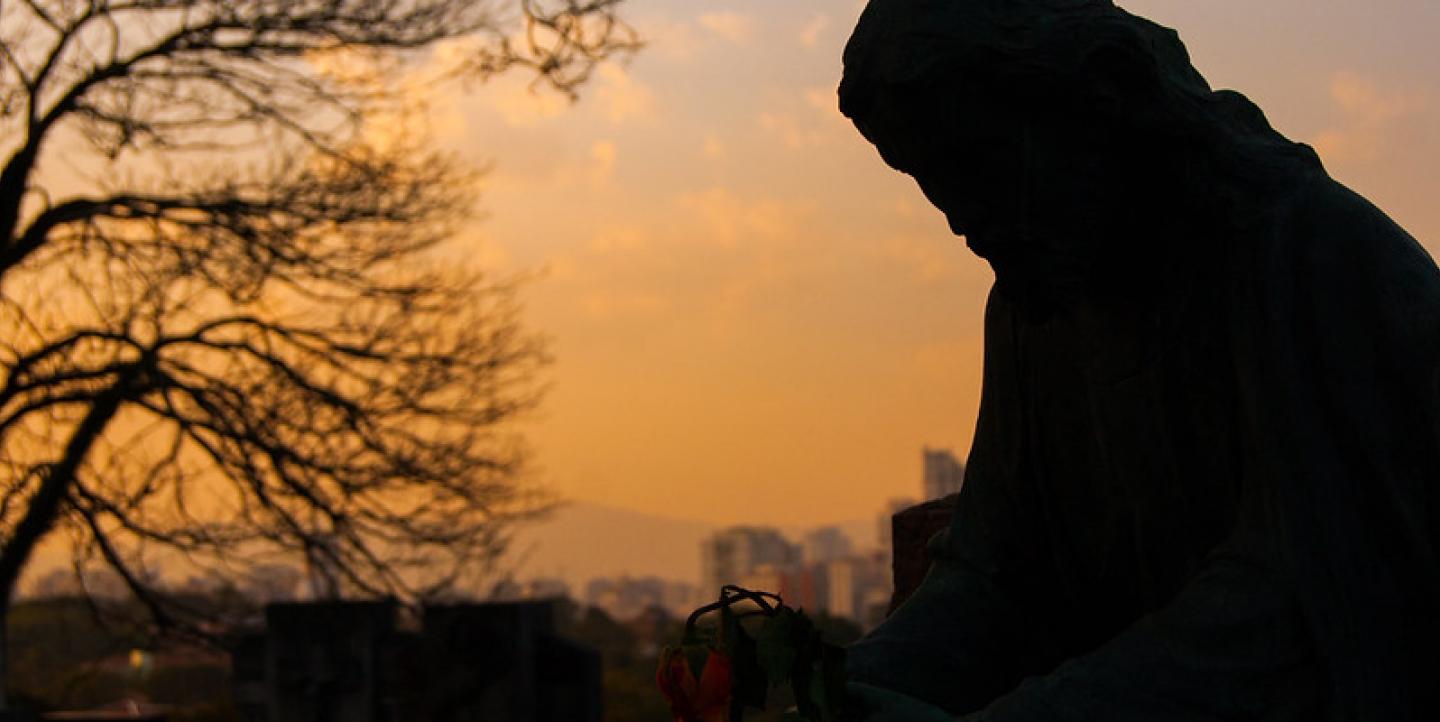
by Amm Admin | Jun 2, 2020 | Blog
byALICE DE SOUZA May 28, 2020 in COVID-19 REPORTING
Brazil has become a new epicenter of the coronavirus pandemic, reaching 20,000 deaths on May 21. The official numbers may be the tip of the iceberg as a study conducted by the University of São Paulo shows the country could have 14 times more infected cases than the number reported. There has also been exponential growth in hospitalizations and deaths from Severe Acute Respiratory Syndrome (SARS), when compared to the previous 10 years. Deaths at home have also increased by 14.6% compared to 2019.
For Brazilian journalists, this created the challenge of telling the stories behind the numbers and of using journalism to help family and friends memorialize their loved ones when funerals and burials are limited by the virus.
Data journalist Judite Cypreste spent two weeks producing a map by municipality of COVID-19 cases in Brazil, but the work made her feel uneasy. “We needed to do a story where the numbers were the starting point and include the stories, the human [side of it],” she said.
Cypreste’s concern gave rise to the special report “Números Subestimados” [Underestimated Numbers], co-produced with journalist Luís Adorno and published on April 30. “This story shows that people are not numbers. It is important to give a face to the data to say that the pandemic is real, that it is happening, that the victims may be your neighbor, a relative. It brings the narrative closer to the readers,” said Cypreste.
Since April 4, Folha de S. Paulo, Brazil’s largest newspaper, has published the special “Histórias de vítimas do novo coronavírus” [Stories of victims of the new coronavirus], which lists obituaries by week. The G1 portal published the page “As vítimas da COVID-19” [The victims of COVID-19], a memorial that compiles stories about the lives of some of the people who died from complications of the new coronavirus. Other news organizations have followed, creating special coverage of the people who have died in the pandemic.
Inumeráveis
Telling the stories hidden under the statistics was also the driving force behind the launching of the collaborative memorial Inumeráveis [Innumerable]. Under the motto “no one likes to be a number, people deserve to exist in prose,” the initiative went live on April 30, inspired by artist Edson Pavoni and social entrepreneur Rogério Oliveira.
The stories for Inumeráveis come together through the efforts of volunteer journalists. “The numbers keep growing, and we must not forget that they mean people, who had a life of love, sadness, happiness, and who left friends and family. The memorial is a portrait, albeit a small one, of this anxiety of not knowing these people,” explained journalist Alana Risso, one of the project coordinators.
Faced with the speed of the pandemic, a group of eight individuals brought the idea to life in three weeks, and since launch, journalists and journalism students can volunteer to collaborate. “We know that no newsroom has enough staff to keep track of the cases, especially considering Brazil’s inequality, where so many places — the news deserts — don’t have a media outlet. So, the idea is to mobilize journalists from all over the country to locate the stories and remember the people who died,” said Rizzo.
Journalists can collaborate with Inumeráveis in three ways. They can report on a story and publish it on the website, upload an obituary that has been published by another media organization or review texts and transcribe audio sent by friends and relatives of COVID-19 victims. The website has a form to upload the stories, as well as contact information for collaborators. Everything that is published is fact-checked, following the initiative’s methodology. According to Rizzo, there are plans to transform the memorial into a print product in the future.
The day after Brazil passed the mark of 10,000 deaths by COVID-19, and two weeks before The New York Times’ front page project, newspaper O Globo devoted its entire front page to a long list of names, ages and phrases about the lives of some of the victims of the new coronavirus in partnership with the Inumeráveis memorial. Among the nearly 140 names, the headline read:
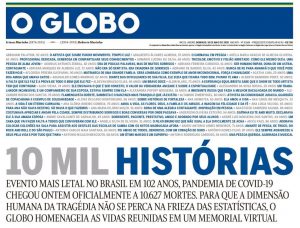
The special report, dedicated to mourning and honoring those who have died had two additional pages. In the text, journalists Rennan Setti and Gabriel Cariello explain that even when reduced to a number, the coronavirus’ lethality is enormous.
Memorial Corona Brasil
Another collaborative initiative is Memorial Corona Brasil, created by the Support Network for the Families of Fatal Victims of COVID-19, a group of 60 organizations in solidarity with the families of victims of the pandemic. Journalists can collaborate by editing the stories on the Facebook page according to the methodology developed by the network, helping comfort families or participating in a working group alongside historians and social scientists to think about ways to memorialize the pandemic.
“There is an experience of redefining how we mourn as we are trying to deal with it very strictly. Society is experiencing mourning and people are afraid. At this time, many people want to connect on social media to pay homage to the memory of those who have passed. Our work is a way to help with the ritual of saying goodbye,” explained historian Danilo César, one of the creators of the network. The network also compiles stories produced by other journalists and conducts their own research to create other forms of pandemic memory.
Source: https://ijnet.org/en/story/names-behind-numbers-honoring-covid-19-deaths-brazil
